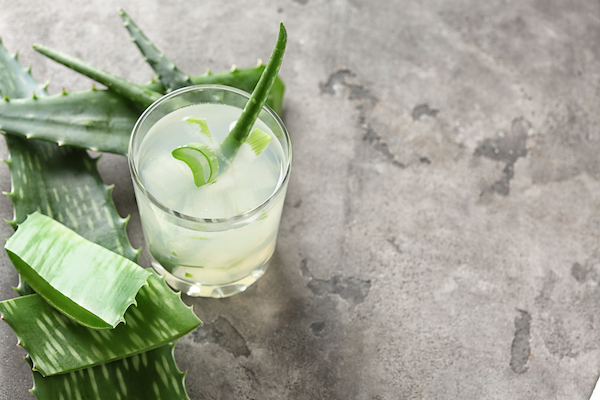
You may already know that aloe vera is a great natural treatment for burns and skin conditions as well as problems with digestion. But did you hear about how it can benefit your immune system? No? Well, let’s explore this connection right now!
Aloe vera and the immune system
The aloe vera plant has a number of qualities that make it a great candidate for helping boost immune system function. In particular, aloe vera appears to have a significant impact on the white blood cells, which are the first line of defense of the immune system. The white blood cells search for and eliminate foreign substances in the body, including bacteria, fungi, and viruses before they can take hold and cause infection.
White blood cells are hard workers, and after a while, they can become less effective unless they receive some support. Aloe vera supplements may be the ticket. Once your white blood cell count is low, then you are susceptible to infection. Similarly, when white blood cell counts are not low, the body is better suited to ward off diseases and infections.
In a 2012 study, researchers evaluated the use of an aloe vera juice product called Aloesorb™ and its impact on white blood cell levels. This formulation of aloe vera maximizes the absorption of the nutrients from the plant. When individuals who took aloe vera were compared with those who took a placebo, the investigators found a 16 percent increase in white blood cell counts when compared with the placebo group.
[Editor's Note: Lily of the Desert (our sponsor) added In 2007 Aloesorb™ a patent-pending concentration of high-molecular-weight aloe polysaccharides, derived from the inner filet of aloe vera plants, to their products.]
Read about the 10 benefits of aloe vera juice
The juice helped reduce free radicals and harmful levels of nitrates while raising levels of helpful white blood cells. People who took aloe vera didn’t experience any adverse effects.
Aloe vera, bacteria, and viruses
Aloe vera also has some other helpful characteristics. For example, it has demonstrated an ability to rupture the cell walls of bacteria in the fight against infection and disease. In one study, a high concentration of aloe vera inhibited the growth of Staphylococcus aureus while lesser concentrations were effective against other common bacteria, including Escherichia coli, Pseudomonas aeruginosa, and Salmonella typhi.
In another study, scientists looked at how aloe vera might be effective against gram-negative and gram-positive bacteria. They discovered that the juice had the most significant impact against gram-positive bacteria, which includes S. aureus, S. epidermidis, Streptococcus pneumonia, and others that can cause pneumonia and other common health challenges.
Read more about the health benefits of aloe vera
How to take aloe vera
Aloe vera is available as a juice and a gel that can be taken alone or mixed with your favorite fruit or vegetable juice. A typical dose is 2 ounces (4 tablespoons), and you can take up to 8 ounces per day. If you are experiencing digestive issues, it’s best to take the juice 15 to 30 minutes before your meals.

The juice and gel provide the same enzymes, vitamins, minerals, amino acids, and polysaccharides. The gel has a slightly thicker consistency, which some people find soothing and is more to their liking. It’s up to you!
Bottom line
If you’re looking for a safe, gentle way to help boost the immune health of yourself, family, and friends, consider aloe vera juice. You can even add aloe vera juice to your morning smoothie as well as enjoy it as a supplement.
More information on aloe vera:
7 Science-Based Reasons to Use Aloe Vera
Why You Need Aloe Vera If You Have Heartburn or Indigestion
Aloe vera recipes:
Watermelon Aloe Vera Popsicles
DISCLAIMER: This article contains affiliate links, which means that if you click on one of the product links, Naturally Savvy will receive a small commission so we can keep pumping out amazing articles like this one. Thank you so much for your support!
Sources
Alemdar S, Agaoglu S. Investigation of In vitro antimicrobial activity of Aloe vera juice. Journal of Animal and Veterinary Advances 2009; 8:99–102.
Montgomery M. Evaluating the safety and efficacy of immune enhancement ORP (oxidation and reduction potential) and reduction of toxicity levels (nitrates) using Lily of the Desert Aloe Vera Whole Leaf Juice enhanced with Alesorb™. Lily of the Desert 2008 Winter
Ndhlala AR et al. Antimicrobial, anti-inflammatory and mutagenic investigation of the South African tree aloe (Aloe barberae). Journal of Ethnopharmacology 2009; 124:404–8.
Philip J et al. Antimicrobial activity of aloe vera barbedensis, daucus carota, emblica officinalis, honey and punica granatum and formulation of a health drink and salad. (revision) Malaysian Journal of Microbiology 2012; 8(3):141–47.
Sedaghat F. Aloe Vera Plant has shown Anti-malarial, Anti-viral, Anticoagulation, Antioxidant, Ulcer-healing Actions and a Booster of Immune System. May Aloe Vera Be Used as a Potential Preventive and Supportive Substance Against Coronavirus Syndrome? Research Gate 2020 April 14











